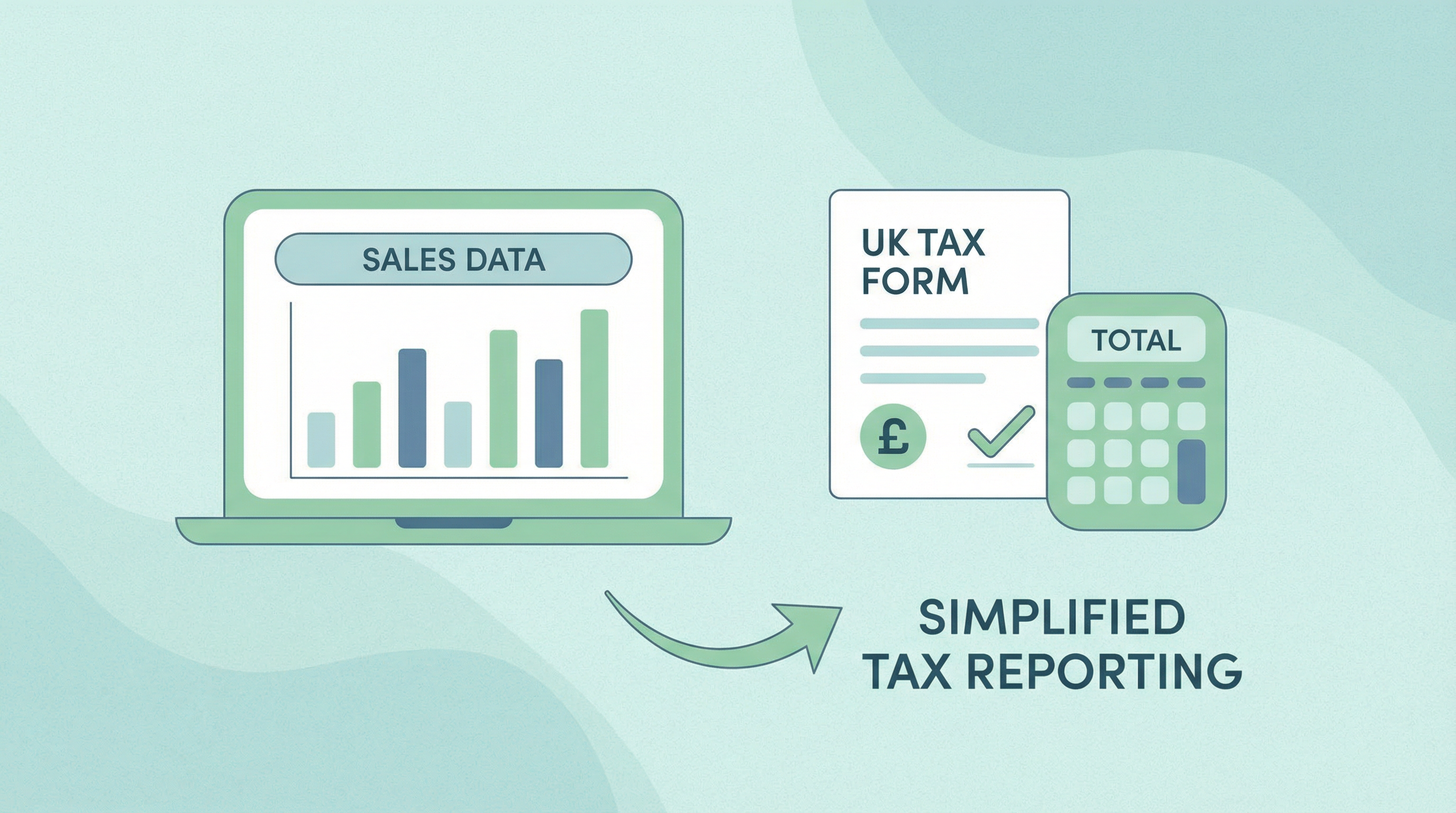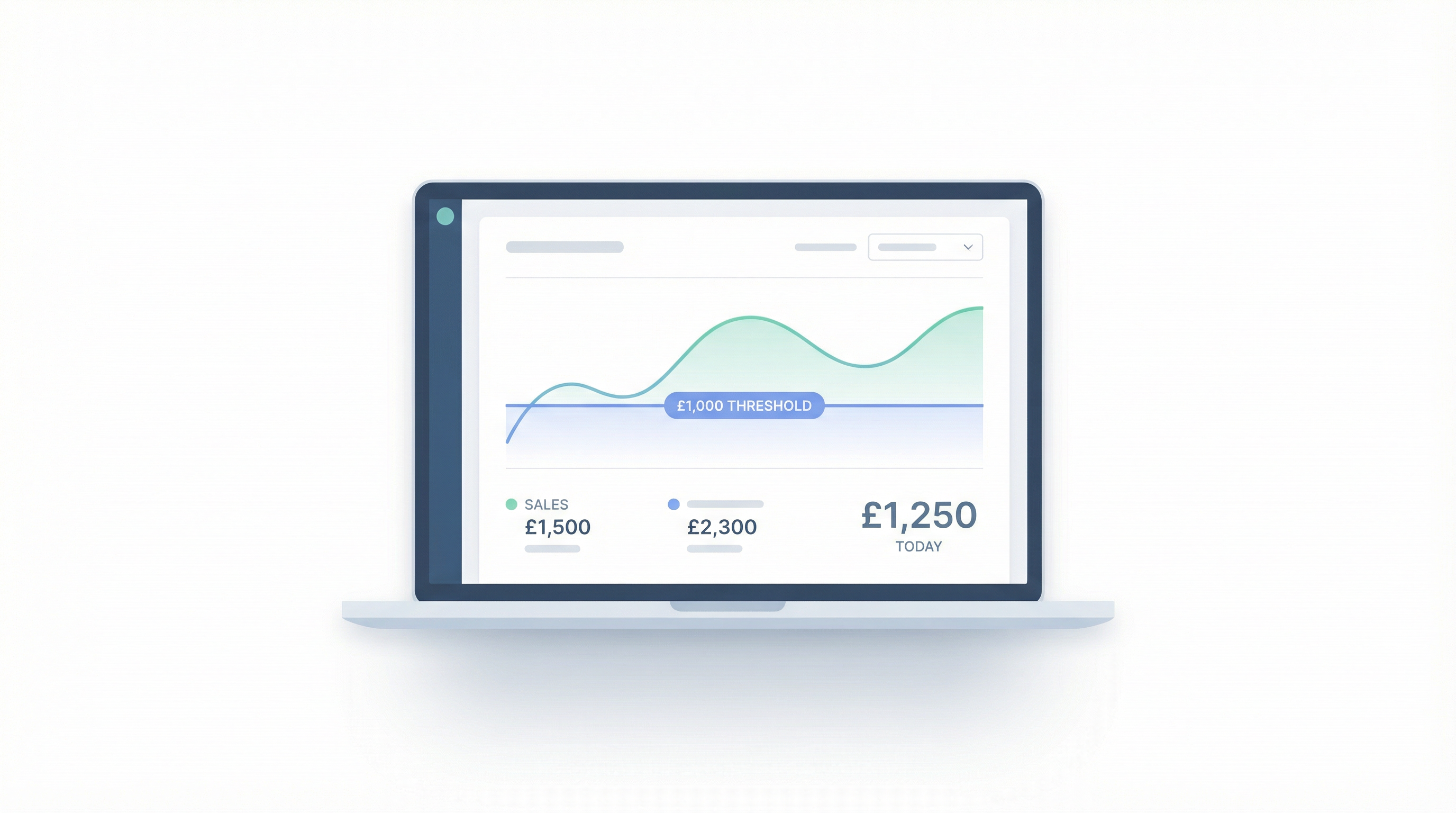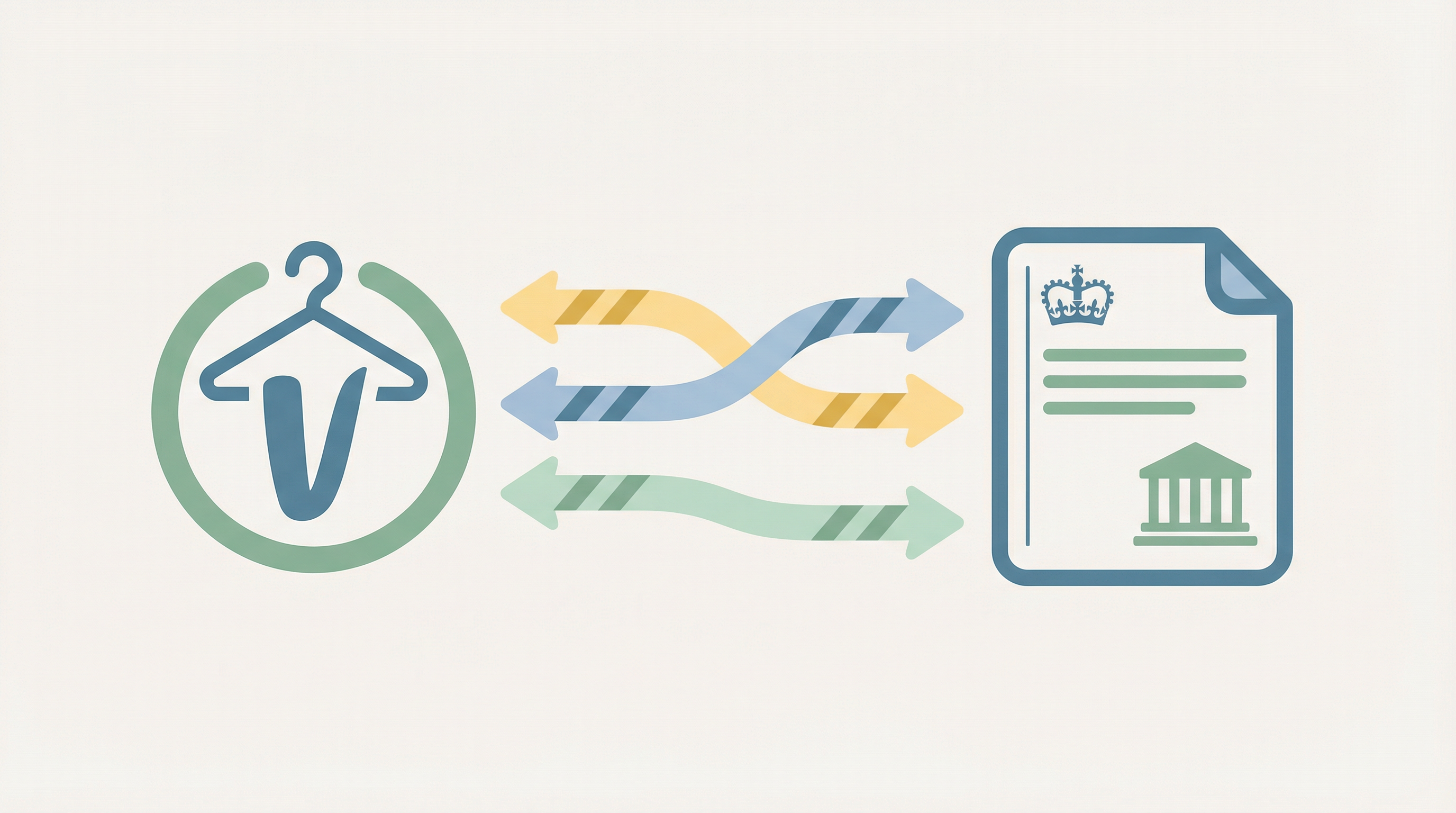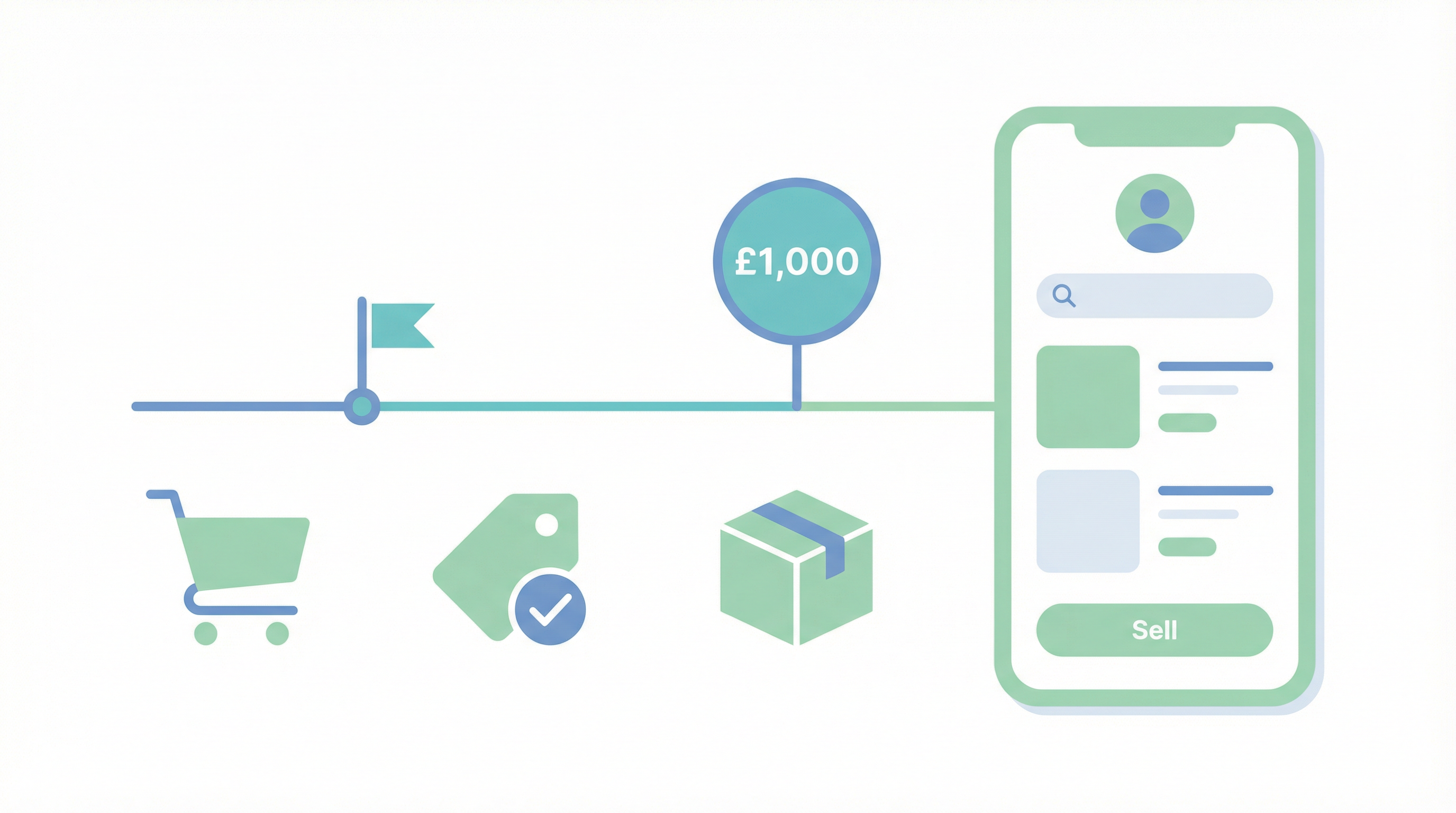Vinted as a Side Hustle: UK Tax Obligations Simplified
Legal Notice: Vinta.app is independent and not affiliated with Vinted; Vinted has not reviewed or approved this content; this material is for information only and does not constitute legal, tax, or accounting advice.

The 'Side Hustle Tax': What Vinted Sellers Need to Know in 2024
The term 'side hustle tax' has been causing a stir online, especially within communities like Vinted. With HM Revenue & Customs (HMRC) implementing new rules for digital platforms to report seller earnings, many Vinted users are wondering what this means for them. Are you just clearing out your wardrobe, or are you running a taxable side business?
This guide cuts through the confusion, explaining exactly what these changes mean for Vinted sellers in the UK, when you need to pay attention, and how tools like Vinta.app can help you stay on the right side of the taxman.
TikTok Community Reaction: Mixed Emotions About Vinted Tax Changes
The response to these tax changes has been intense across social media, with many Vinted sellers expressing confusion and concern. Here's what I shared about this topic on TikTok:
This TikTok reached 165,000 views and sparked hundreds of comments from Vinted sellers sharing their concerns and confusion.
The comments reveal the mixed emotions many sellers are feeling:
"You don't pay any tax on something you haven't made a profit on, so people just selling their clothing they don't want anymore you haven't got to worry, just the resellers that sell for profit!"
"imagine getting taxed your pay then getting taxed for every you pay for then getting taxed for selling items you already paid tax on"
"stop calling it tax its not they just gotta report to hmrc.its no new tax"
These reactions highlight exactly why clear, accurate information is so important. Let's break down what's actually happening.
Is There Really a New 'Side Hustle Tax'?
First things first: the 'side hustle tax' isn't a brand-new type of tax. Instead, new regulations came into force on January 1st, 2024, requiring online platforms like Vinted, eBay, and Etsy to collect and report seller data directly to HMRC. The first of these reports are due by January 31st, 2025.
The aim is simple: to increase transparency and ensure that individuals earning an income from online trading activities are declaring it and paying the appropriate tax, just like traditional businesses.
If you're a Vinted seller who occasionally sells unwanted personal items – that old dress that no longer fits, or books you've already read – you're generally not considered to be 'trading', and these new rules likely won't affect you from an income tax perspective.
The £1,000 Trading Allowance: The Key Figure for Vinted Sellers
The crucial factor determining if your Vinted selling activity is taxable income is whether you are 'trading' and if your earnings exceed the £1,000 trading allowance per tax year.
You are likely 'trading' if you:
- Buy items specifically to resell them for a profit on Vinted.
- Make items yourself to sell for a profit.
- Sell items frequently and operate in a business-like manner.
If your gross income (total earnings before any expenses) from these trading activities across all online platforms (not just Vinted) is more than £1,000 in a tax year (6th April to 5th April), you need to register with HMRC for Self Assessment.
It's important to distinguish this from selling personal possessions. While income from simply decluttering your own used items isn't usually subject to Income Tax, be aware of Capital Gains Tax. If you sell a single personal item for a profit of more than £6,000 (this threshold reduced to £3,000 from April 6th, 2024), you might need to report and pay Capital Gains Tax. However, for most Vinted sellers, the trading allowance is the primary concern.
How HMRC's New Rules Impact You as a Vinted Seller
So, what does this mean practically for those selling on Vinted?
- Data Collection by Vinted: Since January 1st, 2024, Vinted (along with other platforms) is required to collect information about its sellers, including the volume and value of their sales.
- Reporting to HMRC: Vinted will then share this information with HMRC. This helps HMRC identify individuals who might be trading above the £1,000 allowance and haven't declared their income.
- Your Responsibility: It's vital to understand that Vinted is not deducting tax on your behalf, nor are they stopping you from selling if you exceed £1,000. The platform's role is to report data. You, the seller, are responsible for declaring your income and paying any tax due.
- Already Registered? If you're already registered for Self Assessment and faithfully report your Vinted trading income, these new platform reporting rules shouldn't change much for you, other than reinforcing the importance of accurate record-keeping.
- Not Registered but Trading Over £1,000? If your Vinted (and other platform) trading activities generate over £1,000 gross income per year and you haven't registered, now is the time to do so to avoid potential issues.
There has been some concern in the Vinted community that these rules are a targeted attack. However, this initiative is broad, covering many types of online income generation, and aims to level the playing field between online sellers and traditional businesses regarding tax obligations.
What Happens if You Don't Declare Your Vinted Trading Income?
HMRC has stated they will use the data from platforms to check if sellers are declaring the right amount of tax. If your online sales exceed the trading allowance and you haven't declared this, you could face an investigation, fines, and interest on any unpaid tax.
Penalties can vary depending on:
- The amount of tax evaded.
- The number of years tax was not paid.
- Whether the disclosure was prompted by HMRC or volunteered by you.
- Whether there was a lack of reasonable care or deliberate evasion.
It's always best to be proactive and ensure your tax affairs are in order.
Navigating Your Tax Obligations as a Vinted Seller
If you suspect your Vinted selling has crossed into 'trading' territory and you're nearing or exceeding the £1,000 allowance, here's what to do:
1. Determine if You're 'Trading' on Vinted
Honestly assess your activity. Are you buying clothes or other items with the primary intention of reselling them for a profit on Vinted? Do you do this regularly? If so, and your total gross income from these sales across all platforms is over £1,000, you are likely trading.
2. Register for Self Assessment
If you're trading and earn more than £1,000, you must register for Self Assessment with HMRC. You can do this easily online via the Gov.uk website. Once registered, HMRC will issue you a Unique Taxpayer Reference (UTR) number.
3. File Your Annual Tax Return
You'll need to complete a Self Assessment tax return online each year, detailing your income and any allowable business expenses. The deadline for online submission is usually 31st January after the end of the tax year.
Allowable expenses for Vinted sellers can include:
- The original cost of items you bought to resell.
- Vinted seller fees.
- Packaging costs (envelopes, tape, etc.).
- Postage costs (if you pay for them and aren't reimbursed by the buyer).
- A portion of your home utility bills if you use your home for business (rules apply).
- Software and accountancy fees.
Tax is only due on your profits (your trading income minus your allowable business expenses) that exceed your tax-free Personal Allowance (which is £12,570 for the 2023/24 and 2024/25 tax years). Crucially, even if your profits are below the Personal Allowance but your gross trading income is over £1,000, you still need to file a tax return.
Making Tax Less Taxing: How Vinta.app Helps Vinted Sellers
Keeping meticulous records of your Vinted sales and related income is essential for completing an accurate tax return. This is where Vinta.app comes in, designed specifically to simplify the financial admin for Vinted sellers.
Simplify Order Management & Sales Tracking
Vinta.app helps you manage your Vinted orders efficiently and, crucially, provides a clear and accurate record of all your sales. This gives you an instant overview of your Vinted income, vital for knowing if you're approaching that £1,000 trading allowance.
Export CSVs for Easy Self Assessment
One of the standout features for tax time is Vinta.app's ability to export your sales data as a CSV file. This spreadsheet can be incredibly helpful:
- For Individuals/Sole Traders: You can use the data from this CSV to easily fill in the income sections of your Self Assessment tax return, saving you hours of manual calculation and reducing the risk of errors.
- For Accountants: If you use an accountant, providing them with a clean CSV of your Vinted sales makes their job easier (and potentially cheaper for you).
- For Vinted Pro Sellers/LTD Companies: If you're a Vinted Pro seller operating as a limited company, accurate sales figures are fundamental for preparing your company accounts and corporation tax return. Vinta.app provides this essential data.
By streamlining your sales tracking, Vinta.app empowers you to understand your financial position and makes gathering the necessary information for HMRC much simpler.
Don't Panic, Prepare!
These new HMRC rules aren't designed to catch out genuine individuals making a bit of space in their homes by selling old personal items. The £1,000 trading allowance means many casual Vinted users won't need to do anything different.
However, for those who are actively buying items to resell for profit on Vinted, it's a clear signal to get your financial house in order. Understanding your obligations and keeping good records is key. If you're ever in doubt about your tax situation, seeking advice from a qualified accountant is always a sensible step.
Conclusion
The "side hustle tax" spotlight on online platforms means Vinted sellers engaged in trading need to be proactive. If your gross income from buying and selling for profit on Vinted and other platforms exceeds £1,000 a year, you must register for Self Assessment. Keep detailed records, understand your allowable expenses, and file your tax return on time.
Ready to take control of your Vinted finances and prepare for tax season with confidence?
Vinta.app is here to help you track your sales and simplify your admin.
➡️ Discover how Vinta.app can streamline your Vinted selling journey!
Tags

George Jefferson
Vinted Pro Seller and founder of Vinta.app, sharing expert insights on professional Vinted selling, tax compliance, and scaling your online business.


